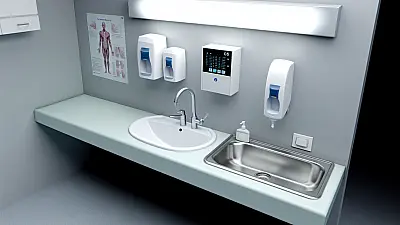DECATUR, GA - State inspectors found that wound care staff at The Crossings at East Lake failed to follow basic hand hygiene protocols while treating a resident with a severe stage 4 pressure ulcer, potentially exposing the vulnerable patient to infection risks.

Serious Infection Control Breach Documented
During an unannounced inspection on January 8, 2025, state surveyors observed a wound care nurse treating a resident's stage 4 sacral pressure ulcer without following established hand hygiene protocols. The nurse was observed removing contaminated gloves and immediately putting on new gloves without sanitizing her hands between the glove changes.
The resident receiving care had intact mental capacity and was dealing with a stage 4 pressure ulcer - the most severe category of pressure wound that extends through all layers of skin and into underlying muscle, bone, or supporting structures. These deep wounds require meticulous care to prevent life-threatening infections.
According to the facility's own policy dated February 1, 2024, "All staff will perform hand hygiene procedures to prevent the spread of infection to other personnel, residents, and visitors." The policy specifically states that "the use of gloves does not replace hand hygiene" and requires staff to "perform hand hygiene prior to donning gloves, and immediately after removing gloves."
Medical Significance of Hand Hygiene Failures
Hand hygiene represents the single most important measure for preventing healthcare-associated infections. When caring for open wounds, particularly deep pressure ulcers, proper hand sanitization creates a critical barrier against bacterial contamination that can lead to serious complications.
Stage 4 pressure ulcers already present significant infection risks due to their depth and exposure of underlying tissues. These wounds can develop osteomyelitis (bone infection), sepsis (bloodstream infection), or other life-threatening complications if bacteria are introduced during care procedures.
The contaminated gloves that the nurse wore while handling wound materials could harbor dangerous microorganisms including methicillin-resistant Staphylococcus aureus (MRSA), Clostridium difficile, or other pathogens common in healthcare settings. Without proper hand hygiene, these organisms can transfer from the contaminated glove surface to clean gloves and ultimately to the wound site.
Staff Acknowledgment of Protocol Failures
When questioned by inspectors, the wound care nurse acknowledged her error. "She stated she should have sanitized her hands in between glove change to prevent the spread of germs to R64," according to the inspection report. The nurse further admitted that "the resident could get an infection if she did not sanitize her hands after removing her gloves and before putting on a new pair of gloves."
The unit manager confirmed proper protocols during her interview, explaining that staff should sanitize their hands before entering resident rooms, while providing care, after removing gloves, and before putting on new gloves. She warned that failure to follow hand hygiene procedures "would be the residents could get infections."
Clinical Standards and Best Practices
Standard wound care protocols require healthcare workers to perform hand hygiene at multiple points during treatment procedures. According to established medical guidelines, proper technique involves:
- Hand sanitization before initial patient contact - Hand hygiene before donning gloves for sterile procedures - Hand sanitization immediately after glove removal - Additional hand hygiene before applying new gloves - Final hand sanitization before leaving the patient area
For residents with stage 4 pressure ulcers, these protocols become even more critical. The deep, open wounds provide direct pathways for bacteria to reach bone, muscle, and surrounding tissues. Healthcare-associated infections in these vulnerable areas can result in delayed wound healing, extended hospitalizations, additional surgeries, or potentially fatal systemic infections.
The resident's treatment plan included daily wound cleansing with Dakin's solution, application of collagenase ointment for wound healing, and ongoing wound consultation services - all procedures requiring strict infection control measures to be effective.
Administrative Response and Oversight
The facility's Director of Nursing acknowledged during the inspection that hand hygiene should be performed throughout wound care procedures. He emphasized that staff must "adhere to the standard precautions and precautions related to the wound" and follow clean technique requirements.
The nursing director specifically confirmed that hand hygiene protocols require sanitization before donning gloves, after removing gloves, and before putting on new gloves. He noted that failure to follow these procedures "could cause delayed healing for the resident."
Impact on Wound Healing Outcomes
Infection control failures can significantly compromise treatment effectiveness for pressure ulcer patients. Stage 4 wounds already face challenges healing due to their depth and complexity. When bacterial contamination occurs, the body's immune response diverts resources from tissue repair to fighting infection.
Infected pressure ulcers may require aggressive antibiotic therapy, surgical debridement of infected tissue, or other interventions that prolong treatment timelines and increase patient discomfort. In severe cases, infections can spread to surrounding tissues or enter the bloodstream, creating medical emergencies requiring hospitalization.
Additional Issues Identified
Beyond the hand hygiene violation, the inspection revealed other areas where the facility's infection control program needed improvement. The Centers for Medicare & Medicaid Services cited the facility for failing to "provide and implement an infection prevention and control program" that meets federal standards.
The violation was classified as having "minimal harm or potential for actual harm" affecting "few residents," indicating that while serious, the scope was limited to specific incidents rather than systematic failures throughout the facility.
State regulators noted that the deficient practices created "potential to increase the risk of infection due to cross-contamination and the potential to increase the risk of spread of infection" to both the affected resident and others in the facility.
The inspection findings underscore the critical importance of consistent infection control training and oversight in nursing home settings, where residents with complex medical conditions depend on proper clinical protocols to prevent complications and support healing.
Full Inspection Report
The details above represent a summary of key findings. View the complete inspection report for East Lake Arbor from 2025-01-09 including all violations, facility responses, and corrective action plans.
💬 Join the Discussion
Comments are moderated. Please keep discussions respectful and relevant to nursing home care quality.